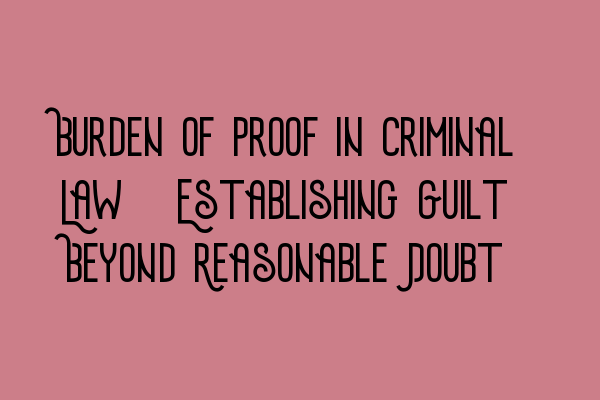Burden of Proof in Criminal Law: Establishing Guilt Beyond Reasonable Doubt
In criminal law, the burden of proof lies with the prosecution to establish the guilt of the accused beyond a reasonable doubt. This principle is fundamental to the criminal justice system and ensures that individuals are not unjustly convicted. In this article, we will delve deeper into the concept of the burden of proof and its implications in criminal cases.
What is the Burden of Proof?
The burden of proof refers to the obligation of the prosecution to prove each element of a crime beyond a reasonable doubt. This means that the evidence presented must be so convincing that it leaves no room for any reasonable doubt in the minds of the jury or judge. If the prosecution fails to meet this standard, the accused must be acquitted.
The concept of the burden of proof stems from the fundamental principle that an individual is innocent until proven guilty. It places the onus on the prosecution to produce sufficient evidence that establishes guilt beyond any reasonable doubt. This ensures that the decision to convict someone of a crime is not taken lightly and is based on strong and convincing evidence.
Reasonable Doubt: A High Standard
Establishing guilt beyond a reasonable doubt is a high standard that the prosecution must meet. It requires the absence of any reasonable explanation or alternative hypothesis that could give rise to doubt about the accused’s guilt. This standard allows for the possibility that there may be some doubt, but it must not be reasonable doubt that would lead a rational person to conclude that the accused is not guilty.
Reasonable doubt is not an arbitrary or subjective term. It is an objective standard that is determined by the trier of fact, be it a jury or a judge. It takes into consideration all the evidence presented, the credibility of witnesses, and the overall strength of the case. Only if the evidence is so compelling that it excludes any reasonable doubt can a conviction be justified.
The Role of the Defense
In a criminal trial, the defense plays a crucial role in challenging the prosecution’s case and raising reasonable doubt. The defense may present evidence, cross-examine witnesses, and make arguments that cast doubt on the prosecution’s case. This highlights the importance of effective legal representation and the need for a fair and balanced trial.
It is important to note that the burden of proof rests solely on the prosecution, and the defense is not required to prove the innocence of the accused. The defense’s primary objective is to challenge the prosecution’s case and demonstrate that there is reasonable doubt about the guilt of the accused.
Implications for the Criminal Justice System
The burden of proof beyond a reasonable doubt is a cornerstone of the criminal justice system. It safeguards the rights of individuals and prevents wrongful convictions. This high standard ensures that only the guilty are convicted and that innocent individuals are protected.
Additionally, the burden of proof promotes the fairness and integrity of the criminal justice system. It forces the prosecution to thoroughly investigate and prepare their case, ensuring that they have sufficient evidence to meet the high standard of proof. It also encourages a robust and rigorous examination of the evidence, ensuring that justice is served.
Conclusion
In criminal law, establishing guilt beyond a reasonable doubt is a fundamental requirement. The burden of proof lies with the prosecution, and it is their responsibility to present evidence that is so convincing that it leaves no reasonable doubt in the minds of the trier of fact. This high standard ensures the protection of individual rights and prevents wrongful convictions. Therefore, the burden of proof in criminal law is a vital component of a fair and just criminal justice system.
For more information on the SQE Criminal Law & Practice, you may refer to our related articles:
